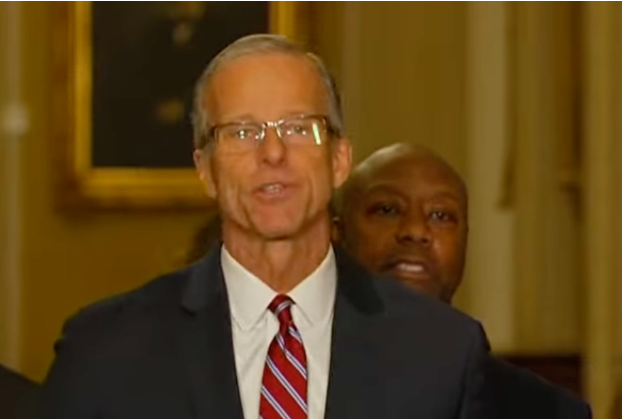Breaking News
John Thune Wins Secret Ballot to Become the New Senate Majority Leader

Source: YouTube
South Dakota Senator John Thune has been elected as the new Senate majority leader, succeeding Mitch McConnell in January. Thune secured his leadership position through a secret ballot, narrowly defeating Texas Senator John Cornyn in the second round of voting. This win positions Thune as a key figure in the GOP-controlled Senate under President-elect Donald Trump’s administration. Despite being labeled “weak and ineffective” and a “RINO” by Trump in the past, Thune has managed to mend his relationship with the president-elect. Trump refrained from endorsing any candidate in the leadership race, even as prominent allies such as Elon Musk and Tucker Carlson backed Florida Senator Rick Scott.
A Balancing Act: Thune’s Approach to Leadership
Thune’s election signals a shift in GOP Senate leadership while maintaining ties to traditional Republican values. Known as an institutionalist, Thune has worked to balance his relationship with Trump and the broader Republican agenda. His voting record, which aligns with Trump’s policies over 90% of the time, reflects his commitment to advancing the president-elect’s priorities. However, Thune’s past criticisms of Trump, including his comments after the January 6 Capitol attack, cast a shadow over their relationship. In 2022, Trump even considered recruiting a primary challenger against Thune. Despite these tensions, Thune and Trump have reportedly smoothed over their differences in recent months, with regular communication following Thune’s leadership win.
Thune has been strategic in bridging the gap between his leadership style and Trump’s agenda. He has emphasized his dedication to the conservative platform, including key issues such as tax reform and judicial appointments. His ability to fundraise for fellow Republicans and campaign alongside them in critical races also strengthened his case for leadership. By focusing on unity, Thune has sought to present himself as a stabilizing force in a polarized political climate.
Internal GOP Dynamics and Expectations
Thune’s leadership win comes amidst a divided Republican Party. While some GOP senators preferred Thune’s pragmatic approach, others supported Rick Scott’s more conservative vision. Senators Ted Cruz, Marco Rubio, and Rand Paul were among Scott’s high-profile backers, but Scott’s first-ballot elimination underscored the party’s preference for Thune’s steadier hand. Thune inherits a Republican Senate majority and faces the challenge of unifying the party around Trump’s agenda. While Thune has pledged to support Trump’s policies, he has also emphasized preserving the Senate’s institutional integrity, particularly regarding the filibuster. Trump has occasionally called for its elimination, but Thune has firmly stated his intention to uphold the 60-vote threshold.
This balancing act reflects the broader tension within the GOP. Moderates like Lisa Murkowski and Susan Collins have sometimes opposed Trump’s initiatives, while staunch conservatives like Josh Hawley push for more aggressive measures. Thune’s ability to navigate these factions will determine his success as majority leader. By electing Thune, GOP senators have shown a desire to maintain legislative independence while advancing a pro-Trump agenda.
Thune’s Leadership Amid Challenges
As Senate majority leader, Thune will play a pivotal role in advancing Trump’s legislative priorities, from extending tax cuts to securing cabinet confirmations. However, his leadership will likely be tested by potential divisions within the GOP. Moderates and staunch conservatives may present challenges to consensus-building, particularly on controversial issues such as healthcare reform and immigration policy. Thune’s leadership also represents an effort to restore public confidence in the Senate as a deliberative body. He has pledged to work across the aisle where necessary while ensuring that Republican values remain central to legislative priorities.
Thune’s election signals a subtle pushback against Trump’s more controversial tendencies. While he has expressed loyalty to Trump’s platform, his history as an institutionalist suggests he may resist efforts to erode Senate traditions. This includes his commitment to retaining the filibuster, a stance that could put him at odds with Trump’s more aggressive legislative strategies. Nonetheless, Thune’s focus on unity and collaboration within the GOP offers hope for a more cohesive party moving forward. His ability to bridge divides and lead effectively will be critical as the Senate navigates key policy debates under the new administration.
Will John Thune maintain the Senate’s independence during the Trump administration? Tell us what you think.
